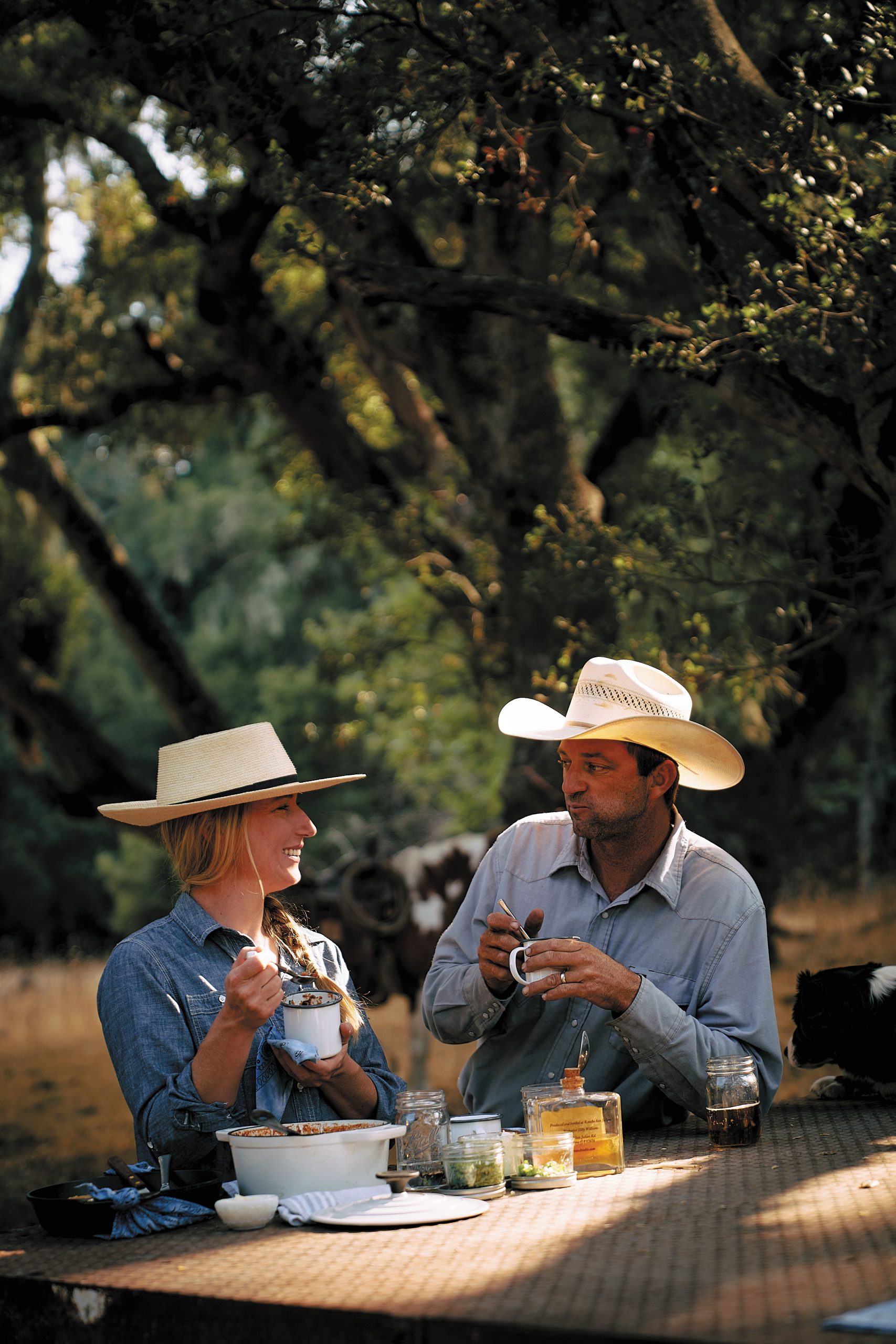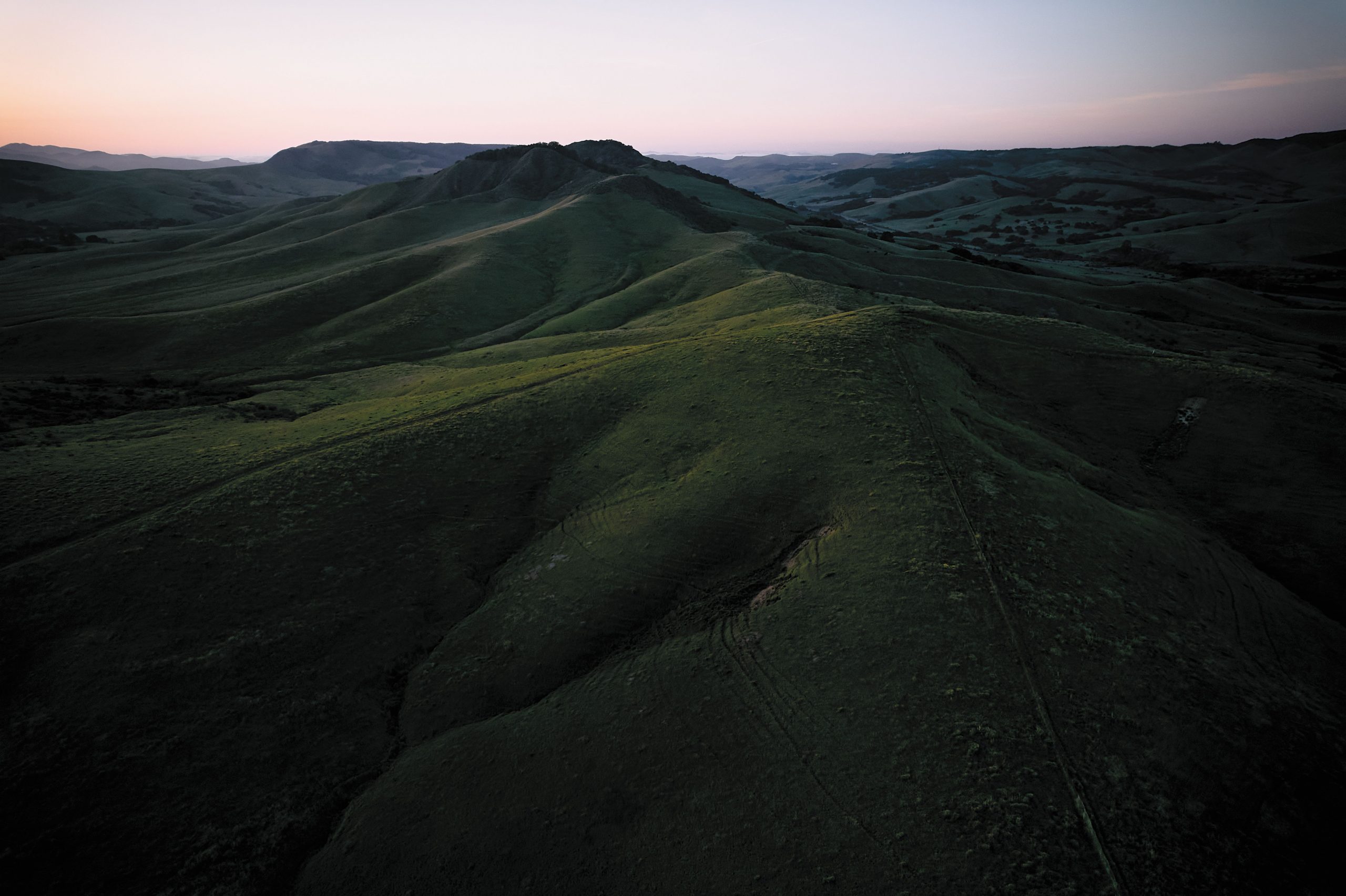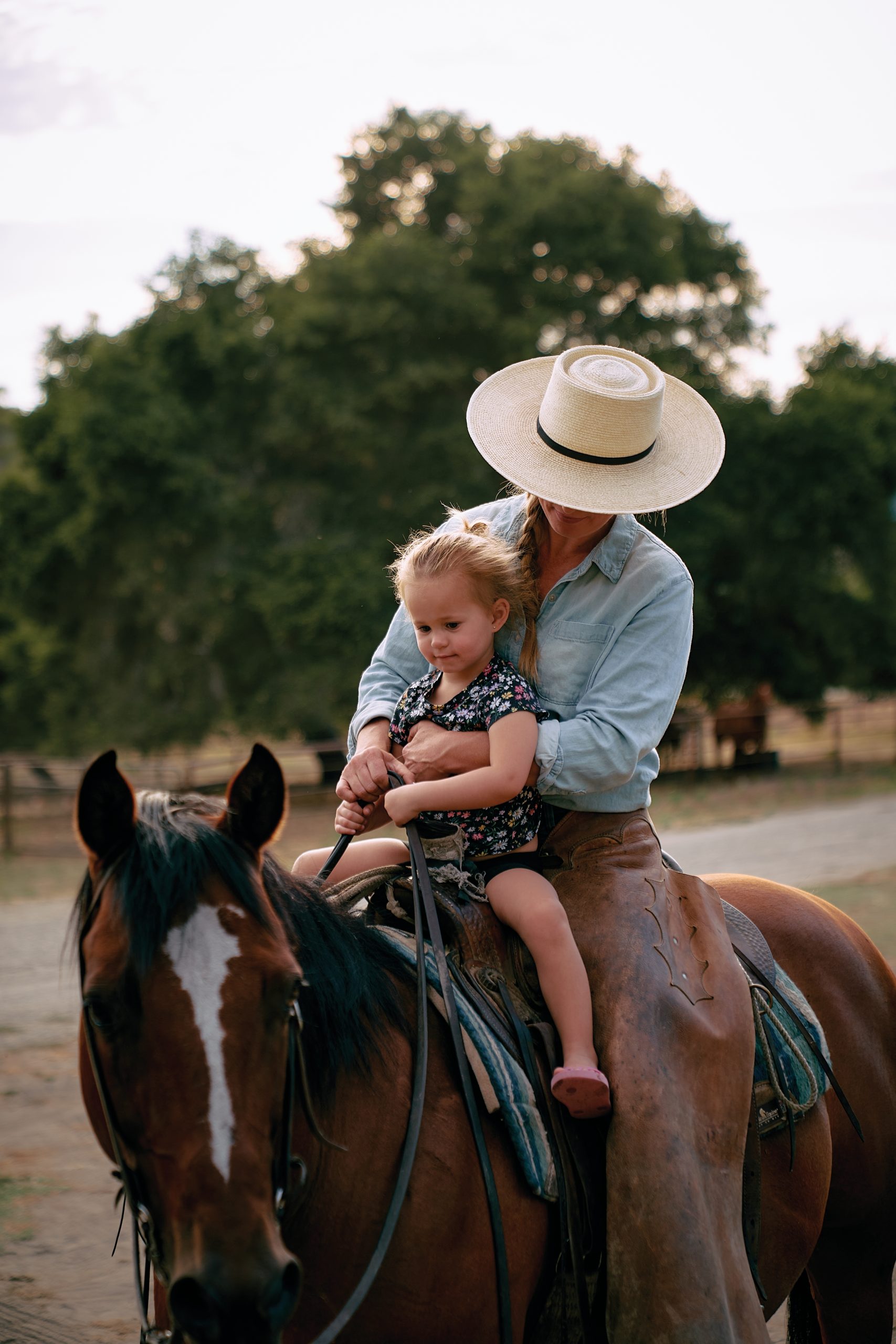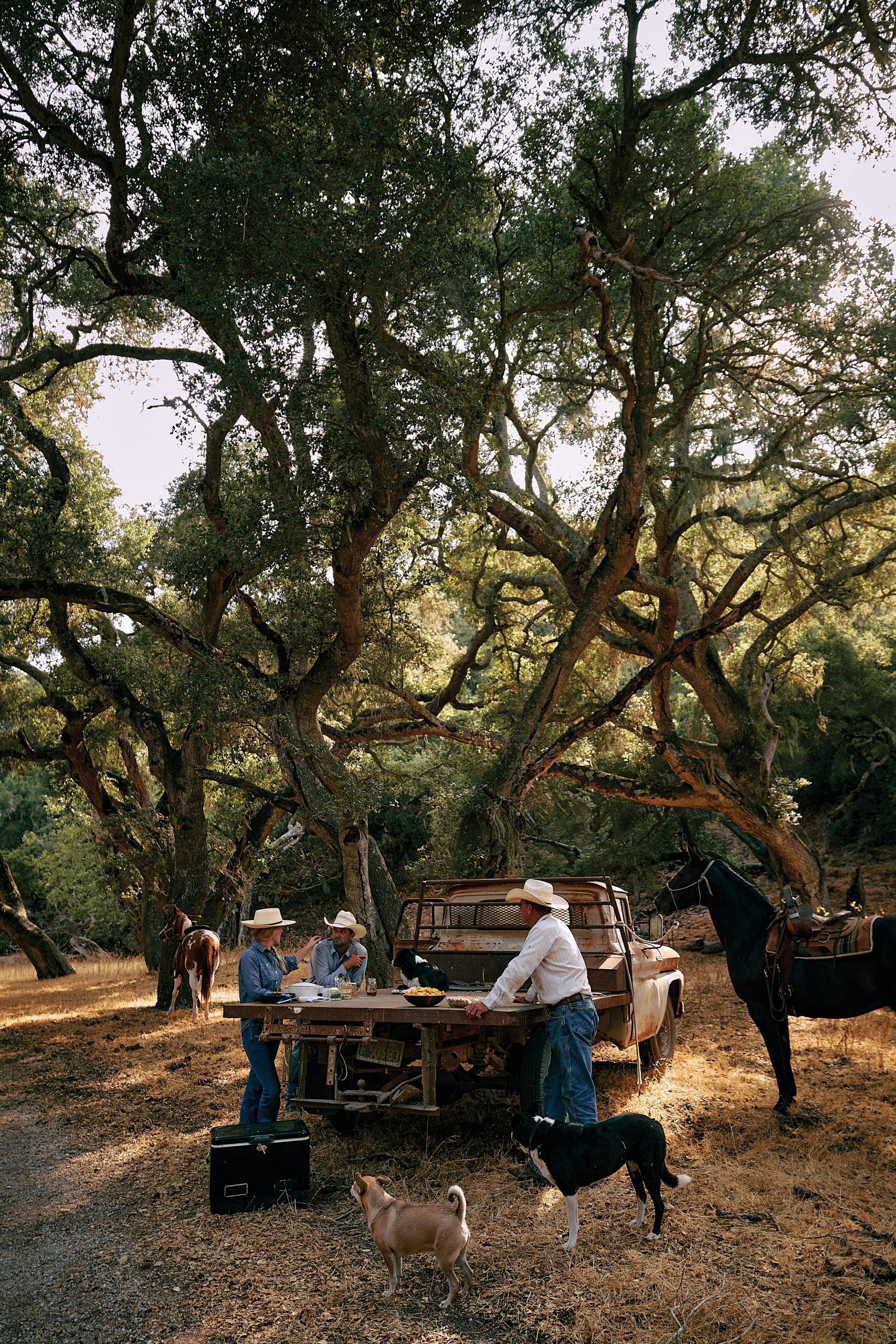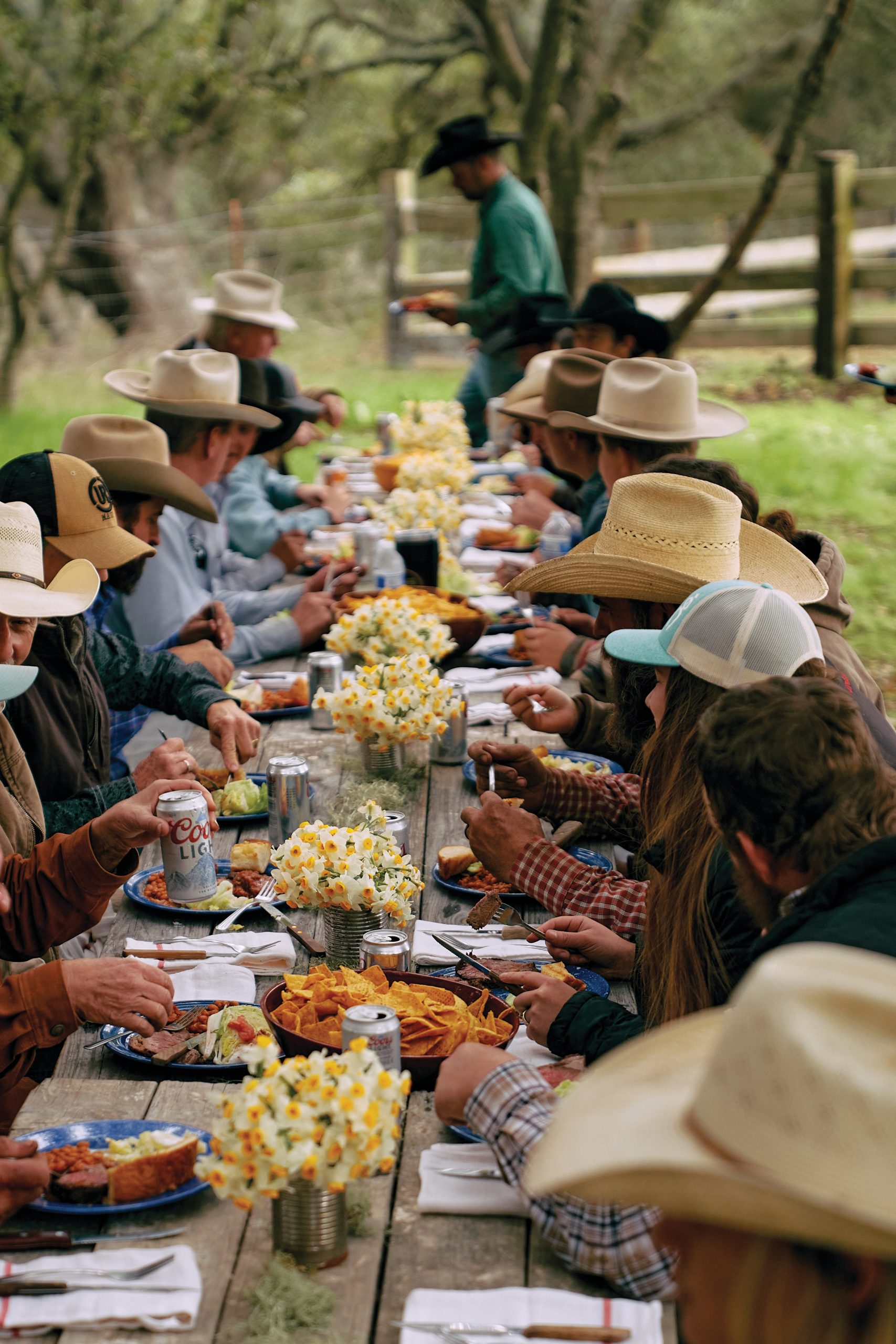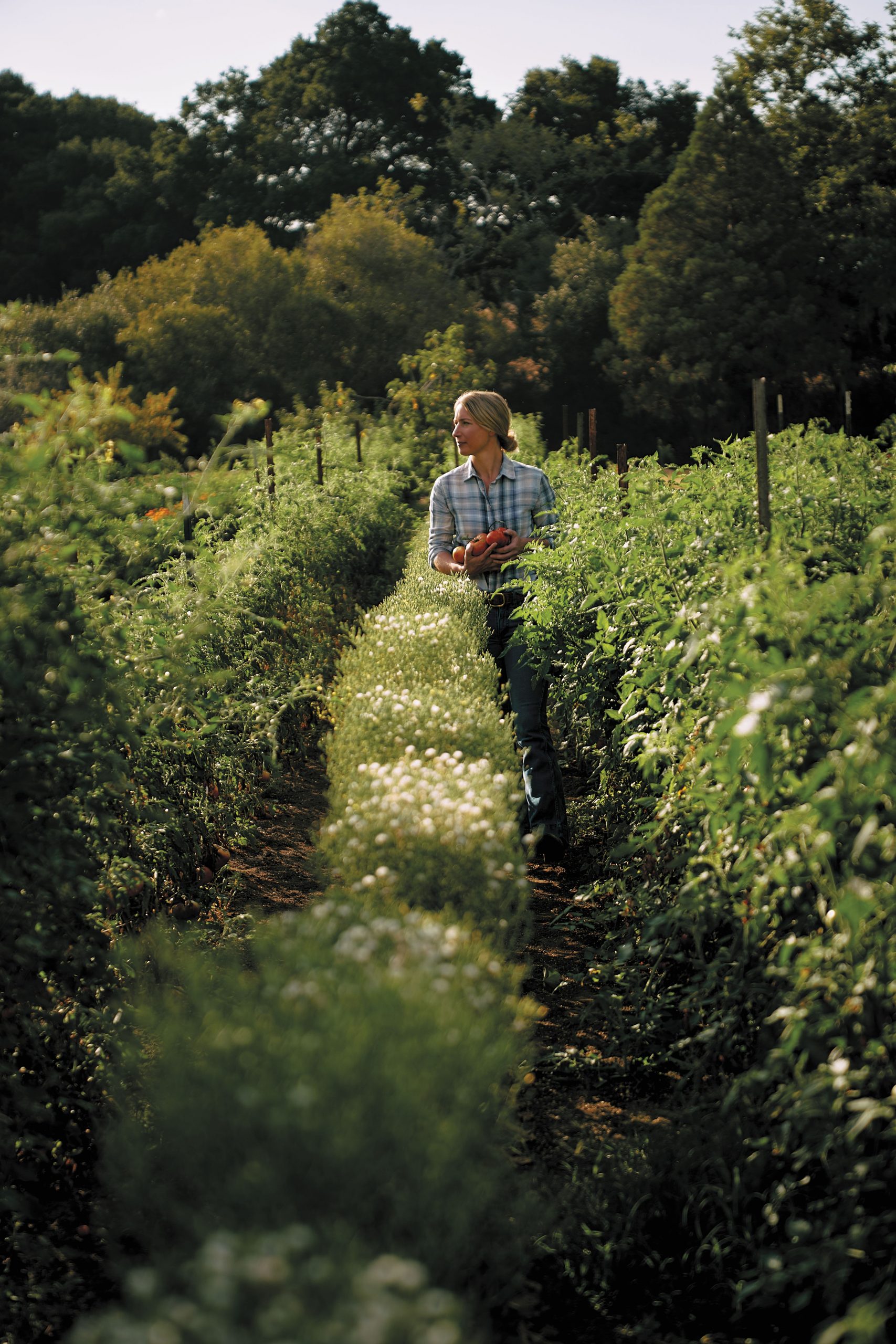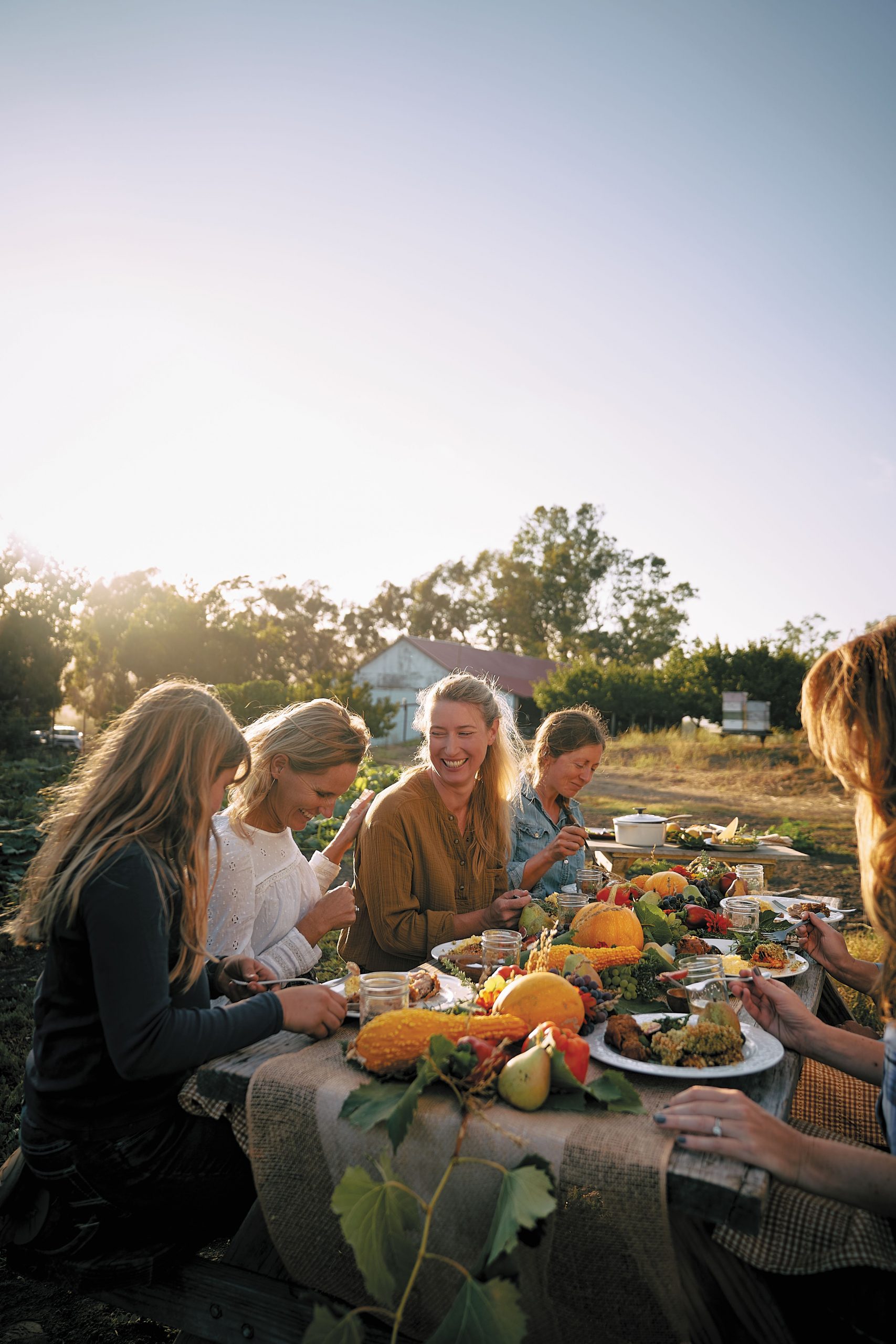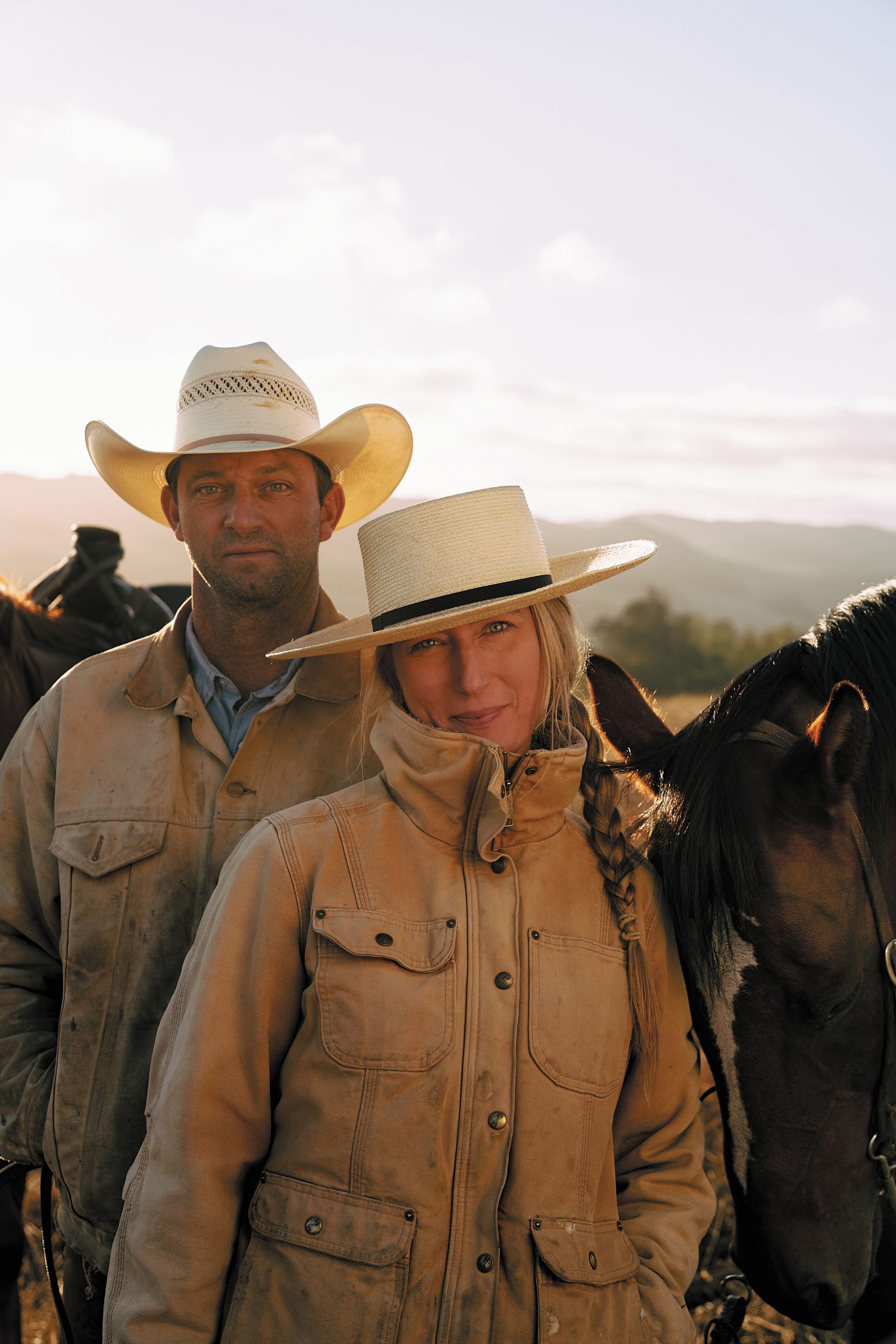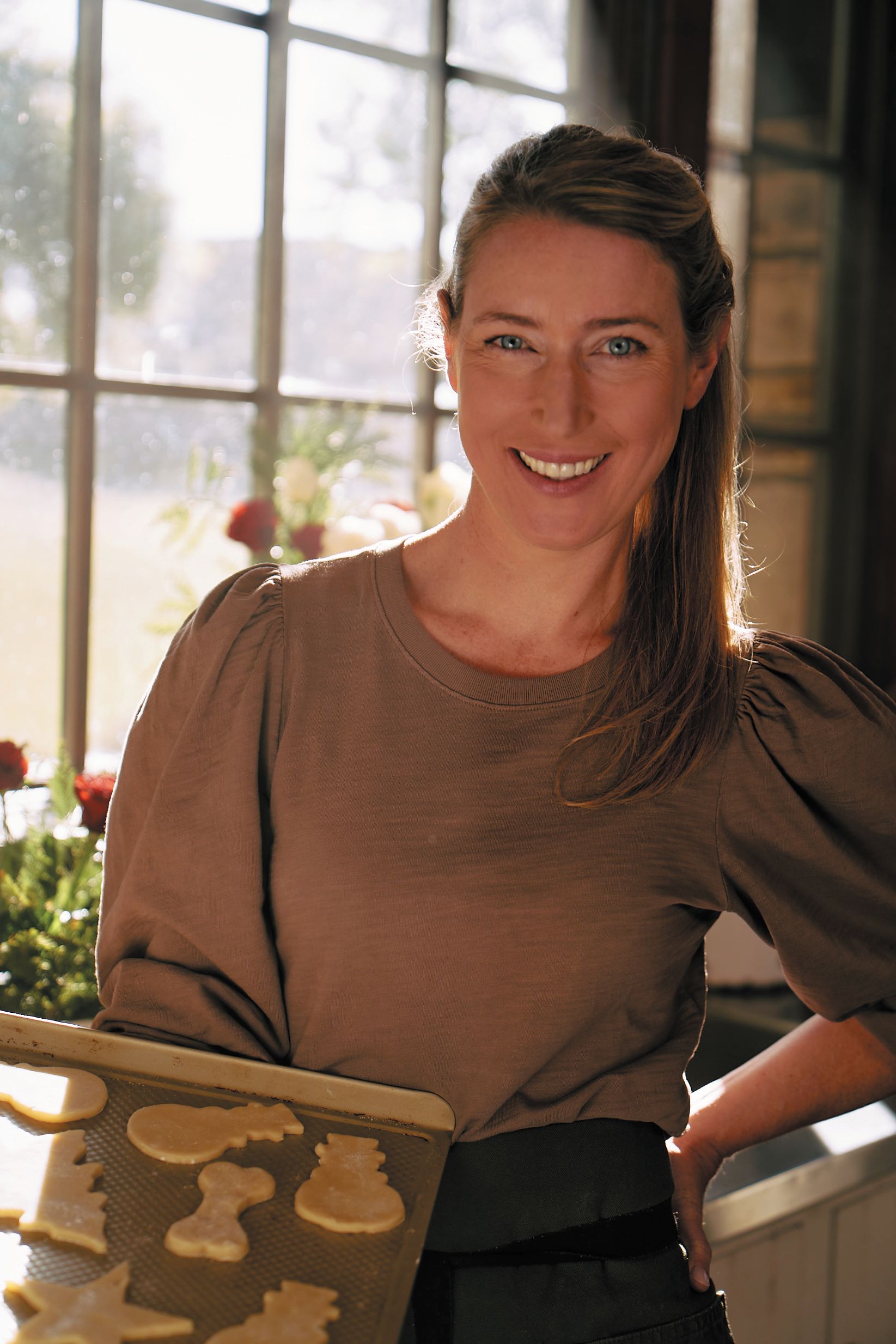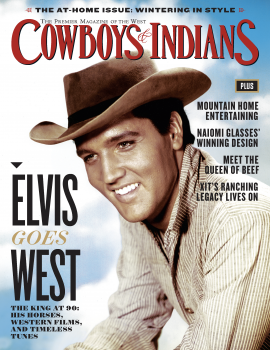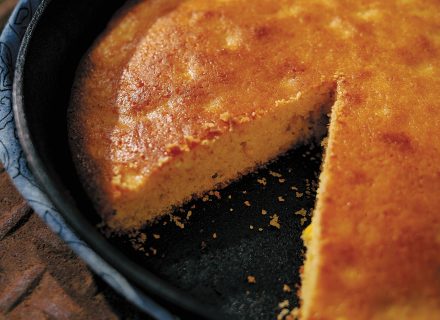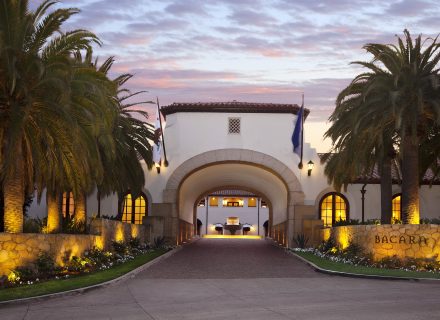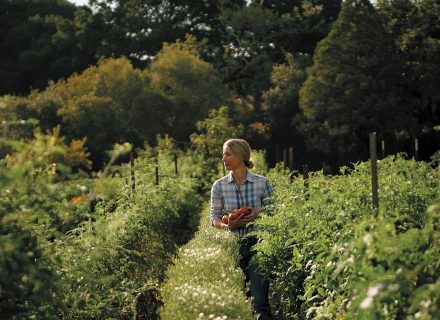Through her TV show, cookbook, and daily life on her historic California ranch, Elizabeth Poett celebrates family, the land, and gathering together for a good meal.
Ever since America’s first TV network cooking show aired back in 1946, food on the tube has drawn a hungry audience — and a strangely gluttonous one for culinary combat these days. How exactly we went from NBC’s genial I Love to Eat — hosted by James Beard himself nearly 80 years ago — to today’s flashy lineup of gastro-wars starring dueling chefs, pedantic judges, and “pack your knives and go” catchphrases is anyone’s guess. But as bingeable as Top Chef, Chopped, and Guy’s Grocery Games might be, food at its best will never be about competition at all.
It’s about those other two Cs.
“I love celebrations and I love connecting with people, and I’m sure that’s a big part of why I’ve always been drawn to cooking,” says Elizabeth Poett, host of Ranch to Table — the sort of deliciously warm and welcoming cooking show in an idyllic setting that we’d like to think Mr. Beard would’ve really dug, too.
“I’m not a classically trained chef, I didn’t go to cooking school, and I’d never call myself a chef,” Poett says. “At my heart, I’m a rancher who just loves to cook — and I want to be able to share that love because it doesn’t have to be stressful. It shouldn’t be stressful. To me, the only thing stress brings to cooking ... is stress.
“I think that preparing food should be fun, light, and creative — something to truly savor and celebrate,” she adds. “Just like sharing a wonderful meal with important people in your life.”
A 7th-generation rancher, Elizabeth Poett hosts Ranch to Table from her home kitchen at Rancho San Julian — a historic 14,000-acre cattle ranch tucked on a remote corner of California’s Central Coast. This is where she grew up. It’s where her dad toddled around as a kid, and her grandmother, and so on.
The storied property — granted in 1837 to prominent Santa Barbara landowner and presidio comandante José de la Guerra (Elizabeth Poett’s great-great-great-great-grandfather, whose painted portrait hangs prominently at the nearby Santa Barbara History Museum) — has a long and winding family history. But the land itself remains immutable. An oak-studded, oceanbreezed slice of Golden State heaven that’s about as far from Hell’s Kitchen as it gets.
“A friend once told me that I’m the anti-Gordon Ramsay,” laughs Poett, who would find herself drawn back to the family ranch after college in the Midwest and years in New York City and Los Angeles. Going away was an important chapter for her. So was returning to Rancho San Julian, it turned out.
“I think deep down I always wanted to come back,” Poett says. “It was more a matter of when, and what would be my place here. I knew that I wanted to create something that would be my own, and that can be a tricky thing on a multigenerational ranch. We’d been running cattle, but I also wanted to pursue my own thing — and cooking was always that. So, I started having these Ranch Table events, where people could come to the ranch and learn about its history, the ranching spirit, and then be able to enjoy an amazing meal here.”
Poett’s Ranch Table events quickly took off and have become a mainstay in the spring and summer months. While raising a family on the property with her rancher husband, Austin, who now manages the ranch, and embracing nearly 200 years of family roots at Rancho San Julian while continuing to cultivate her own spot in it, Poett’s latest endeavor — hosting a successful cooking show on national television — wasn’t exactly part of the master plan. Fortunately for California-style comfort food fans everywhere, it happened anyway.
It was like “a friend-of-a-friend’s-cousin’s-neighbor kind of thing,” Poett says about the unexpected genesis of Ranch to Table, which wrapped Season 4 last year and can be viewed on the Magnolia Network, Discovery Plus, and HBO Max. When the show’s producers first pitched the idea to Poett, she originally balked.
“I thought, Oh gosh, thank you so much — but no. I was just really wary about what they might be looking for — a show that would make country life look too quaint, too idyllic, too perfect,” says Poett, who eventually came back to the table and set some terms. “I told them I’d be willing to put together a little something that I’d be comfortable doing: ‘If you like it, great. If you don’t, that’s fine too.’ ”
Four seasons and 32 episodes later, Ranch to Table has found a big audience by just being its own little-something self. No fake, flashy “kitchen” studio. No canned jokes. No panicky competitors sweating over sweetbreads and red wine reduction. The show lives and dines by its simply delicious meals and straightforward opening lines, narrated by Poett herself:
“This place grows and inspires some amazing things. I’ve been cooking big ranch meals since I was a kid. It’s how I grew up. It’s all about fresh, seasonal, simple, delicious food. It’s that philosophy, food, and life that inspires me every day.”
Episodes of Ranch to Table all revolve around Poett preparing a home-cooked meal tied to a specific occasion that’s usually tipped off by its title — “Brunch With the Boys,” “Lunch With Mom,” “Good Neighbors,” “Cooking for the Crew,” “Apple Season.” From here, each casual cooking demo delves deep into the delectable. French dip sandwiches with horseradish herb butter. Chicken parmesan or marsala. Just-caught whitefish (from over the hill at the beach) in lemon dill sauce. Fresh-churned ice cream, strawberry shortcake with ginger whipped cream, homemade cannolis, Grandpa’s chocolate cake ... Ranch to Table isn’t short on favorite family recipes, and it does not shy away from dessert.
Nor does it ignore all the juggling of tasks happening on a working cattle ranch — just in case anyone thought it was all cannolis and happy cows out here in charming coastal California. Fence mending. Branding and rotating cattle. Walking the pigs (more on that in a moment). Busting up fallen oaks with chainsaws. Welding. Roof repair at the property’s original ranch house — while the cheesecake is cooling. Poett partakes in that stuff too on the show. It’s no picnic in paradise.
The Ranch to Table production includes unscripted cameos by Poett’s ranch manager husband, Austin; their two sons, Jack and Hank; Poett’s parents (who still live and work on the property), ranch crew members, friends, neighbors, visiting cousins, and a pile of four-legged scene-stealers, including several resident pooches (one for each family member) and a pair of 450-pound pet sows named Charlotte and Harriet.
Tune in to enough episodes and you get a clear sense that the work here never really ends, except when it briefly does. And whenever that happens, it’s time to sit down together — with family, friends, helpful neighbors, the whole dedicated village it takes at a place like this — and seize the moment over a fine meal. It might be a casual sit-down at home or a special spread behind the old “Casa” ranch house. Memorable meals at Rancho San Julian have been enjoyed on a hill full of wildflowers and stunning views, by a running stream in an oak grove, and off the back end of a pickup in a cattle field.
However the “Ranch Table” is set, the toothsome takeaway is always this: There’s no better place to have worked up an appetite — and no better people to be sharing it with.
“I feel that the Ranch Table is more than just a ranch and a table,” Poett tells me over the phone before an upcoming visit. “It’s a feeling of comfort and joy and just celebrating being able to enjoy a meal together. That’s something that I truly believe can be brought to any home kitchen wherever you are. I mean, I’m all over the ranch when we’re doing meals, and to me it’s one of my most fun things to do — to be able to take this feeling on the go.”
Wherever the ranch table ends up, generosity and gratitude are important ingredients, too.
“At many of these ranches, and certainly ours, you can’t do it alone without your family, friends, neighbors, and community pitching in at so many different times of the year that are all surrounded around food. My hope from the show is that this deep feeling of appreciation and connection through food is shared as well.”
On a sunny Friday morning in early January — after a quick drive up the coast from not-quite-as-quaint L.A. — I’m struck by two things when welcomed to Rancho San Julian by the host of Ranch to Table.
First, television (in all its high-def glory) just can’t do full justice to such a setting. Folded into the hills between a rambunctious curve of Pacific shore near Point Conception and SoCal’s Santa Ynez Valley wine country, this secluded corner of rolling ranchland — about 45 minutes up the coast from Santa Barbara and a dozen miles down California State Route 1 from Lompoc — with its old oak trees, soaring hawks, and salty wind, takes you by surprise even after watching several scenes of it on Max.
Coming from L.A., it’s like space travel. Or it would be, if Elizabeth Poett weren’t so predictably down-to-earth.
When she greets me at the Rancho San Julian gates in a plaid shirt, jeans, work boots, and the same warm, casual smile I remember from “Crème Brûlée Day” (Season 4, Episode 1), I can’t help thinking for a split second, Have we met before? Then it dawns on me — of course we have. Many times. Or, at least, I’ve met Elizabeth Poett — for several one-on-one, comfort food classes via my living room flat screen.
Meeting face-to-face, it’s pretty clear right off the bat that this is one television personality who’s exactly who she is whether the TV cameras are rolling or not. That’s light-years from L.A., too.
“Y’know, crème brûlée is my favorite health food,” I tell Poett, “and you’ve now inspired me to make it for myself. So, thank you.”
“Oh, you can totally do it,” she says. “It’ll be the best crème brûlée you’ve ever had.”
Today’s Ranch to Table “studio tour” begins at the original ranch headquarters where Poett runs her office from the Casa — its original foundation dating back to early 1800s. Passing a duck pond where a lone blue heron is sunning itself on a raft; a horse barn and blacksmith shop (“over 100 years old”); and a massive hay barn (“this is where we’ve started hosting some weddings”), we continue on an old road (“part of the area’s original stagecoach route”) and enter the Casa itself, where a labyrinthine timeline of rooms and addons dating back to various eras over the last couple centuries pops up everywhere like a 19th-, 20th-, or 21st-century kid’s hide-and-seek dream.
“The original building started in that corner over there,” Poett says, leading me through a warren of rooms covered in black-and-white photos (“This is my great-grandmother, and that little boy on the left is my grandfather”), a giant antique map of Santa Barbara County, some old horse bridles hanging on a random door, a neatly scrawled grocery list dated July 13, 1896, framed in one of two kitchens, and a long wooden table and grandfather clock in the “cowboys’ dining room,” where stagecoach travelers once chowed down and, more recently, Poett hosted her cousins for a family meal on an episode of the show.
“I love this room,” she says, leading me into the sala — a parlor-style space overlooking the garden, furnished with sitting room couches, volumes of old books, and a chandelier.
Outside, behind the house are long rows of picnic tables and a Santa Maria-style barbecue rig under a pergola full of wisteria that will be purple by the next round of Ranch Table Gatherings this May and June.
Nearby are a large vegetable field, some beehives, and apple and apricot orchards beyond that, as well as lavender fields started by Poett’s father, Jim — a former Village Voice writer in New York who’d also felt the pull of this place from far away. Years ago, he came home to manage the ranch, bringing Poett’s mom (a former magazine editor — they met in an elevator at the Voice) with him. While the ranch is mainly about cattle, it also produces and sells its own honey, lavender fragrance products — and, very soon, wine.
“It’s the latest thing here,” says Poett, about the new wine project, while driving us out to see the vines en route to the ranch’s signature hilltop view in a UTV stuffed with dogs — Fran sharing shotgun, Captain on my lap, and the indefatigable Gertie dashing ahead of us, leading the way. Their first grape harvest happened earlier this year, and they’ll be doing the bottling this summer. Eventually they’ll want to dryfarm the grapes, as they currently do with their vegetables. “My dad was like, ‘We’re gonna do this!’ which is totally him,” Poett says. “He’s quite the innovator and incredibly determined — he’s always thinking of ways to evolve the ranch.”
“He’s not the only one,” I shout over the engine.
“Actually, that’s the entire family,” Poett says. “My great-grandmother moved everyone here from Santa Barbara during the influenza pandemic over a hundred years ago — and she insisted on bringing the entire house with them — as in the house itself — on a barge.”
Rolling past the young pinot and chardonnay vines neatly arranged in a slanted clearing, we slow down for a crowd of free-roaming cows. “They just finished calving, and we’re gonna start branding next week,” Poett says. “It’s going to be very, very busy.” Then we pass Harriet and Charlotte noshing in the mud, like 900 collective pounds of porcine pet joy. “They’re a ridiculous pair,” Poett says, laughing. “Austin, my dear husband, was like, ‘What are we doing?’ But I love them, and now they’re family.”
Does Elizabeth Poett feel her two centuries of ancestry all around her here, I wonder aloud, while we stop in front of half of a fallen oak tree blocking our route to that magical vista point that will have to wait for another day — after the chainsaws come out.
“Everywhere, and all the time,” she says, turning the UTV around and moving Plan B into swift motion.
We pull into a woodsy area, where a flock of wild turkeys hustle out of our way. Leading us to a patch of ground covered in fallen oak leaves dotted with orange mushrooms here and there, Poett pulls out a Swiss Army knife.
“Do you like chanterelles?” she asks, slicing enough of them to fill a basket.
Who doesn’t? Actually, I’m not sure I’ve ever had them. Definitely not freshly foraged ones guarded by a family of wild turkeys.
“There’s a recipe in my cookbook for chanterelles on toast that I’ll have to show you,” she says.
They’ll be the best chanterelles on toast I’ve ever had.
Purchase Elizabeth Poett’s The Ranch Table cookbook and watch Ranch to Table on Max.
From our May/June 2024 issue.
PHOTOGRAPHY: Courtesy of B.J. Golnick







